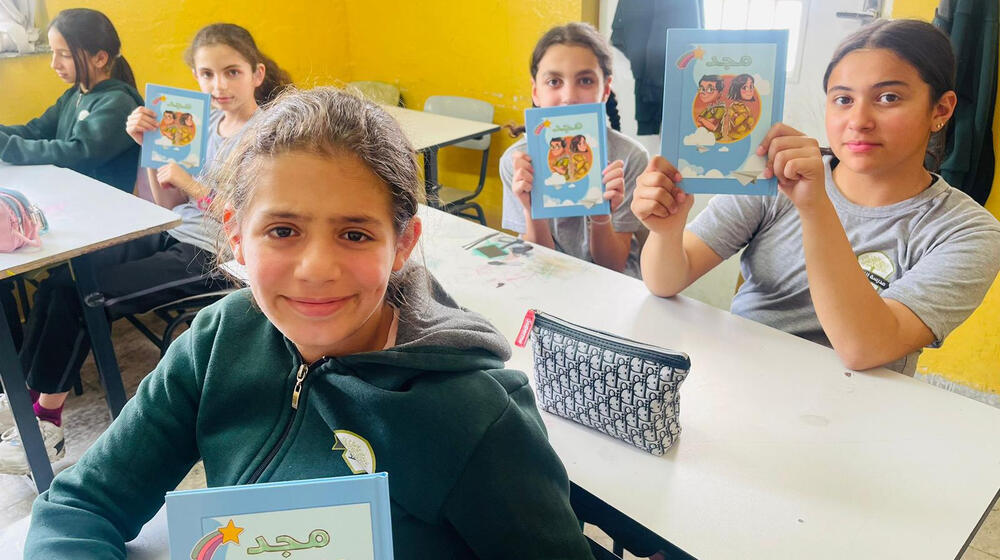Updates
Belgium and UNFPA engage young people to change harmful social norms and advance gender equality in Palestine
05 Jun 2023
Updates
05 Jun 2023
PALESTINE – All over the world, unequal gender and social norms cause harm to women and girls and hinder progress towards gender equality. But creating real change requires a profound shift in perceptions and challenging attitudes, including of men and boys – which can take generations to shift – as well as investing in programmes and initiatives that can bring about tangible change.
In Palestine, traditional patriarchal attitudes combined with the effects of the Israeli occupation have created an environment of oppression against women and girls. A UNFPA study conducted in Palestine showed that 38 per cent of men and 23 per cent of boys agreed that at times, a woman “deserved to be beaten”. Additionally, about 70 per cent of both girls and boys felt that changing diapers and feeding children were the sole responsibility of the mother. “Shame!” was the first reaction when sexual and reproductive health was broached. Thankfully, more and more voices, especially among young Palestinians, are calling for a change in traditional ideas of masculinity.
Changing norms with Majd
Amid these challenges is a Belgium-supported initiative called the "Majd Journey". In Arabic the name “Majd” means “glory”, and can be given to either girls or boys. Launched in 2020 by UNFPA and the Sharek Youth Forum, the Majd Journey is aimed at engaging adolescents and young people to help them reflect on gender roles, bodily autonomy and adolescent health. With Majd, young Palestinians follow the journey of a 12-year-old virtual ambassador who advocates for positive change and contributes to their community by helping to influence social norms and harmful perceptions of masculinity among vulnerable communities in Palestine.
With the support of Belgium, UNFPA in Palestine is expanding the Majd Journey to 20 schools and 10 Ministry of Social Development youth centers across the country, including the Gaza Strip, East Jerusalem, and the northern and southern West Bank. This scaling up follows the successful pilot in 15 schools in East Jerusalem from 2019 to 2021, which were also supported by the Government of Belgium.
In 2022, some 2,400 students were reached under the Majd Journey interventions through a series of educational sessions and initiatives focusing on gender roles, sexual and reproductive health,puberty and healthy lifestyles. This included prevention and protection from gender-based violence, with a focus on digital violence. Through role-playing activities and discussions, students are learning to challenge traditional gender norms, understand the importance of consent and bodily autonomy, and explore new perspectives on what it means to be a man.
The Majd Journey has also reached young people online, especially during the COVID-19 pandemic. “With Majd, we organized several online summer camps to include COVID-19 precautionary measures in a fun and pedagogical way, reaching thousands while at home,” said Mr. Bader Zamareh, General Director of Sharek Youth Forum. “We reached 12,000 followers on Facebook and 1,000 young people are actively using the Majd mobile app, receiving comprehensive sexuality education through games and challenges. Majd is now one of the nationally adopted tools in the adolescent health teacher and counselor manual,” Mr. Zamareh continued.

“I learned to express my feelings”
The Majd Journey has resulted in positive outcomes among students as much as educators. “I learned to respect women's feelings and rights, to express my feelings, to be fair in my decisions,” said Osaid Mahmoud Hanaysha, 13 years old, from Western Qabatya primary school for boys. “Violence inflicts great damage that we must fight.”
Farah Hasan Sa’abneh, 14 years old, from Fahmeh Secondary Girls School in the West Bank, highlighted how the Majd Diary changed her perceptions on gender roles. “I found out that there are many jobs and tasks that can be done by both genders, and they do not degrade the value of either of them,” she said. Kamal Muhammad, also 14 years old, realized how important it was for him to be a great friend, “to be an attentive listener to my sisters, fostering an environment of understanding and acceptance of their perspectives.”
“With two thirds of the Palestinian population under 30, including 1.5 million adolescents aged 10 to 19, the Majd Journey has been an inspirational tool for Palestinian adolescents to be empowered, protected, healthy and resilient for a safe transition to adulthood,’’ says Mr. Dominic Allen, UNFPA Representative in Palestine.
“Engaging young boys and girls, teachers, and school counselors throughout the project timeline has been an interesting and exciting experience,” says Mr. Wilfried Pfeffer, Consul-General of Belgium in Jerusalem. “We sincerely hope that Majd virtual ambassador, the “Brave Student” and young role model can stand up for the rights of Palestinian girls and boys and contribute to a better, more inclusive society, free from violence,” Mr. Pfeffer continued.
Through transformative initiatives like the Majd Journey, UNFPA with the Government of Belgium and partners are working together to create lasting change and build a more inclusive future in Palestine.